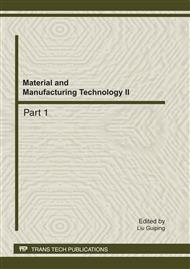[1]
D. L. Donoho, Compressed sensing, IEEE Trans. Inform. Theory, vol. 52(4), p.1289–1306, (2006).
DOI: 10.1109/tit.2006.871582
Google Scholar
[2]
E. J. Candes and M. Wakin, An introduction to compressive sampling, IEEE Signal Process. Magazine, vol. 25(2), p.21– 30, (2008).
DOI: 10.1109/msp.2007.914731
Google Scholar
[3]
E. J. Candes and J. Romberg, Sparsity and incoherence in compressive sampling, IEEE signal processing magazine, pp.969-985, 10th April (2007).
Google Scholar
[4]
E. J. Candes and T. Tao, Reflection on compressive sensing, IEEE signal processing magazine, vol. 58, pp.14-18, December (2008).
Google Scholar
[5]
E. J. Candes and T. Tao, Decoding by linear programming, IEEE Trans. Inf. Theory, vol. 51, no. 12, p.4203–4215, Dec. (2005).
DOI: 10.1109/tit.2005.858979
Google Scholar
[6]
R. Baraniuk, Compressive sensing, IEEE Signal Processing magazine, p.118–124, July (2007).
Google Scholar
[7]
E. J. Candes and T. Tao, Near optimal signal recovery from random projections: universal encoding strategies?, IEEE Trans. Inform. Theory, vol. 52(12), p.5406–5425, (2006).
DOI: 10.1109/tit.2006.885507
Google Scholar
[8]
M. Fornasier and H. Rauhut, Compressed Sensing, April (2010).
Google Scholar
[9]
R. Saab, R. Chartrand, and O. Yilmaz, Stable sparse approximations via nonconvex optimization, IEEE International Conference on Acoustics, Speech and Signal Processing, (2008).
DOI: 10.1109/icassp.2008.4518502
Google Scholar
[10]
I. Daubechies, R. DeVore, M. Fornasier, and S. Gunturk, Iteratively Re-weighted Least Squares minimization: Proof of Faster than Linear Rate for Sparse Recovery, 42nd Annual Conference on Information Sciences and Systems, CISS 2008, pp.26-29, March (2008).
DOI: 10.1109/ciss.2008.4558489
Google Scholar
[11]
R. Chartrand, Exact reconstruction of sparse signals via nonconvex minimization, Signal Process. Lett., vol. 14(10), p.707–710, (2007).
DOI: 10.1109/lsp.2007.898300
Google Scholar
[12]
E. J. Candes, M. B. Wakin, S. P. Boyd, "Enhancing Sparsity by Reweighted L1 minimization, J Fourier Anal Appl., vol. 14, pp.877-905, (2008).
DOI: 10.1007/s00041-008-9045-x
Google Scholar
[13]
R. Chartrand and W. Yin, Iteratively reweighted algorithms for compressive sensing, Proceedings of the 33rd International Conference on Acoustics, Speech, and Signal Processing (ICASSP), (2008).
DOI: 10.1109/icassp.2008.4518498
Google Scholar


